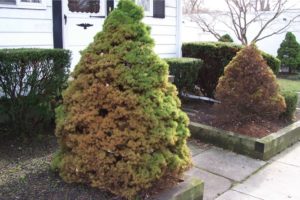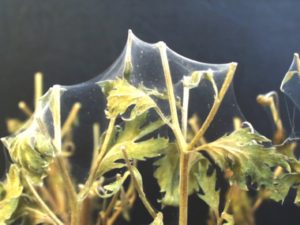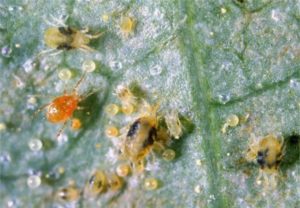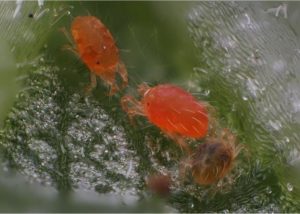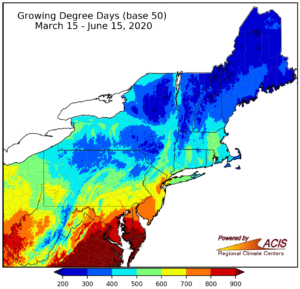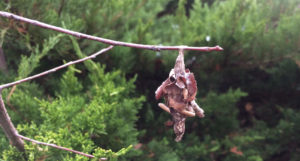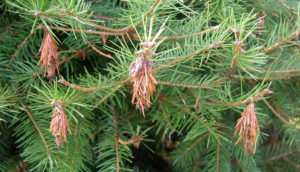There are consistently high infection potentials this week for boxwood blight.
Protective fungicide applications should remain in effect or be initiated immediately.
| Boxwood Blight Risk Model | ||||
| Date | Upper Deerfield (NJ50) | Howell (NJ10) | Pequest (NJ58) | |
| 6/20/20 | S | Low risk | Very low risk | Infection potential |
| 6/21/20 | Sun | Low risk | Infection potential | Infection potential |
| 6/22/20 | M | Infection potential | Infection potential | Infection potential |
| 6/23/20 | T | Infection potential | Infection potential | High Inf. potential |
| 6/24/20 | W | High Inf. potential | High Inf. potential | High Inf. potential |
| 6/25/20 | Th | Infection potential | Infection potential | Low risk |
| 6/26/20 | F | Very low risk | Very low risk | Low risk |
| — | — | — | — | — |
| ^Risk of infection^ | ||||
| adapted from: uspest.org/risk/boxwood_app | ||||
The weather: Don’t let these beautiful early summer days fool you, we all know that violent thunderstorms can appear out of nowhere, bringing with them high winds and rain (wind driven rain) causing high persistent humidity. I.e. the perfect storm for fungal pathogens to spread and successfully infect. Accordingly, many other fungal pathogens are equally active under these conditions and should be managed accordingly. Prevention is always easier than a cure.
These advisories are general in nature so someone from your business should be using this risk model if boxwood is important to your financial stability. In 30 seconds you can have a better idea of boxwood blight (and other pathogen) activity in your immediate area!
Boxwood blight information:
The disease may be sporulating and spreading amongst plantings if present (or may come into your nursery or landscapes via shipments) within the next few days. The pathogen, Calonectria pseudonaviculata, (aka Cylindrocladium buxicola) can also infect other hosts within the boxwood family (Buxaceae). These include common landscape plants such as Pachysandra and Sweetbox, so treatments should be directed towards these hosts as well. Leaf-litter suspected of boxwood blight should only be removed carefully under dry conditions (i.e. do not use a leaf blower to remove leaf-litter in Pachysandra or Boxwood plantings this week!). Additionally, please refrain from touching the plants at all during wet conditions as boxwood blight spores are sticky and can be transferred from plant-to-plant or site-to-site. Please follow proper sanitization and sterilization practices in addition to a preventative spray program. Tools, clothing, and transportation equipment should be routinely cleaned with alcohol or bleach to prevent the spread of this disease. Additionally, this pathogen forms small (yet bomb-proof) survival structures (Microsclerotia) that can remain as a source of infections for 7-10 years within the soil and leaf-litter (part of why you do not want to use a leaf blower to clean out leaf-litter!).
See the following for what to do in multiple boxwood blight scenarios.
Boxwood blight key symptoms:
- Straw-yellow to bronzing leaves that have a characteristic halo of lighter brown and yellow around the infection point.
- LEAVES FALL OFF, TYPICALLY STARTING AT THE BOTTOM. These leaves then act as a source for new infections.
- Twigs will have long brown lesions
Look-a-likes: NOT ALL FOLIAR DISEASES are Boxwood blight:
- Volutella Blight (straw-yellow or golden leaves with pink spores, branches have loose bark).
- Macrophoma leaf spot (straw-yellow leaves with black fungal structures (black spots))
Fungicides;
ROTATE between Fungicide Resistance Action Committee (FRAC codes)
Format: [FRAC code]: Chemical name (Trade names)
- [M05]: Chlorothalonil (Daconil WS)
- [M05 + 1] Chlorothalonil + Thiophanate methyl (Spectro 90WDG)
- [11] Trifloxystrobin + [7] Fluopyram (Broadform)
- [11] Trifloxystrobin + [3] Triadimefon (Armada 50WDG)
- [M03] Mancozeb
- [12] Fludioxonil (Medallion WDG)
- [3] Tebuconazole (Torque)
Always refer to the label for allowable host crops, use-restrictions, application rates, reapplication intervals, re-entry intervals (REI), and mix compatibility information.
DISCLAIMER: Production and pesticide information on this site are for commercial operators only and are NOT for home gardener use. Provided materials represent examples and do not cover all possible control scenarios. Please contact your local agent or chemical sales representative for more information.
Previous Boxwood Blight Plant and Pest Advisory Posts;
- Immediate potential for boxwood blight activity (by Tim Waller)
- Boxwood blight revisited (by Rich Buckley)
- Boxwood blight confirmed in New Jersey (by Rich Buckley)
Additional resources on boxwood blight;
- NC State: Effective materials for boxwood blight
- Virginia Tech extension: Cultural practices and resistant varieties
- Perdue Extension boxwood blight
- University of Kentucky Extension boxwood blight
- Nursery Magazine “Reclaiming boxwood from boxwood blight”
- NJ Department of Agriculture boxwood blight guidelines
Contact: Timothy J. Waller, Ph.D. (twaller@njaes.rutgers.edu)
